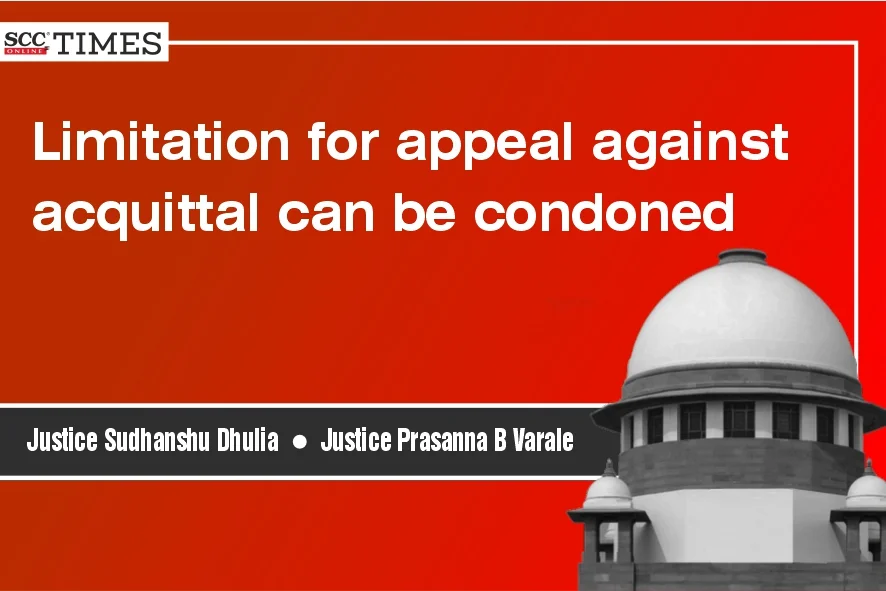Supreme Court: In an appeal challenging Delhi High Court’s dismissal of application challenging condonation of delay for an appeal against acquittal, the Division Bench of Sudhanshu Dhulia* and Prasanna Bhalachandra Varale, JJ. clarified that Section 378 of Criminal Procedure Code, 1973 (‘CrPC’) does not exclude applicability of Section 5 of Limitation Act, 1963.
Brief Facts
The appellant was one of the four accused in a case under Section 135(1)(b) of Customs Act, 1962, who faced trial and was acquitted by the Trial Court. The said acquittal was appealed under Section 378 of CrPC before the High Court with a delay of 72 days, and condonation was allowed by the Delhi High Court on 18-05-2016. The appellant moved an application under Section 482 of CrPC seeking to recall order challenging condonation of delay while claiming that Section 5 of Limitation Act would not apply for an appeal against acquittal. The two applications were dismissed by the High Court on 20-01-2017 without assigning any reasons. The said order for dismissal was challenged in the instant matter claiming that the High Court committed a patent error while allowing the belated appeal against acquittal filed by public servant while it had no powers to condone delay, stating that Section 378 is a self-contained Code for limitation purposes in the absence of any prescribed period for filing appeal against acquittal in the Limitation Act.
Court’s Analysis
The Court referred to Kaushalya Rani v. Gopal Singh, 1963 SCC OnLine SC 41 wherein it was held that ‘Section 5 of the Limitation Act would not apply in an application for leave to appeal under sub-section 3 of Section 417 of the old CrPC before High Court, in as much as Section 417 is a special code in itself and the limitation prescribed therein is 60 days and the court has no power to relax such a limitation to condone the delay.’
The Court perused Section 29(2) of the old Limitation Act to hint that Section 5 of the old Act was expressly excluded in cases where special law or local law provides for a period of limitation. Comparing the old and new Limitation Act, the Court highlighted that in both, the provision of extension of time of limitation is given in Section 5. “Whereas 1908 Act specifically states that Section 5 will not apply when the period of limitation is given in special Acts, the 1963 Act makes Section 5 applicable even in the special laws when a period of limitation is prescribed, unless it is expressly excluded by such special law.” The Court explained the same through a comparative table of Section 29(2) for both old and new provision.
The Court acknowledged that in case of special law prescribing a limitation period, Section 5 of the Limitation Act would have no application and highlighted the importance of language used in the special statute. The Court referred to Sections 81 and 86(1) of the Representation of Peoples Act, 1951, hinting towards the express bar on filing an election petition beyond 45 days, leaving no choice for the Court but to dismiss the election petition filed beyond 45 days’ period.
The Court referred to catena of cases like Hukumdev Narain Yadav v. Lalit Narain Mishra, (1974) 2 SCC 133 and Gopal Sardar v. Karuna Sardar, (2004) 4 SCC 252, and clarified that neither of the two would be applicable to the instant matter since both deal with special laws prescribing limitation period with clear expression of language regarding condonation of delay.
Coming back to the instant matter, the Court clarified that there was no exclusionary provision under Section 378 CrPC, and that the benefit under Section 5 read with Sections 2 and 3 of Limitation Act, 1963 could be availed in an appeal against acquittal. Therefore, the Court vacated the Delhi High Court’s interim order dated 20-03-2017.
[Mohd Abaad Ali v. Directorate of Revenue Prosecution Intelligence, 2024 SCC OnLine SC 162, decided on 20-02-2024]
Judgment authored by: Justice Sudhanshu Dhulia
Advocates who appeared in this case :
For Appellant: Advocate Vijay Agarwal, Advocate Chetan Manchanda, Advocate on Record Md. Shahid Anwar
For Respondent: Additional Solicitor General Vikramjit Banerjee, Advocate on Record Mukesh Kumar Maroria, Advocate Priyanka Das, Advocate Nachiketa Joshi, Advocate Merusagar Samantaray, Advocate Ishaan Sharma







